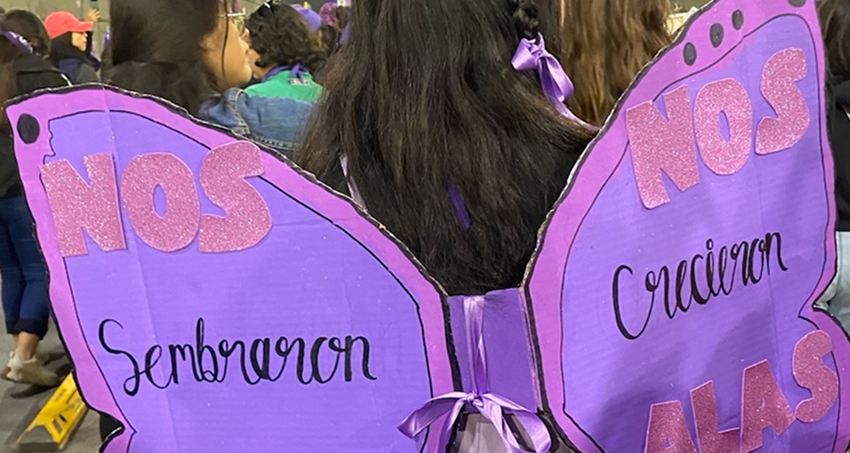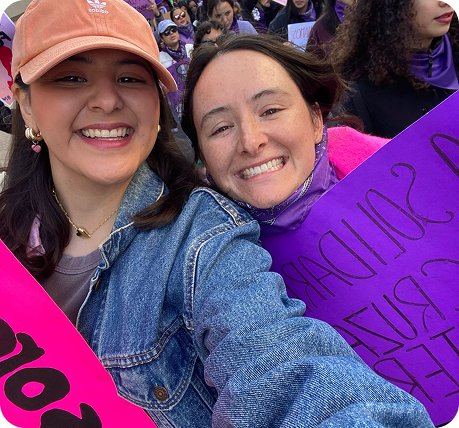8 de Marzo: International Women’s Day in Ciudad Juárez, Chihuahua

The following reflection was written by Victoria de Anda, Abara’s Administrative and Research Assistant, about the annual march in Ciudad Juárez and around the world in honor of International Women’s Day. Solidarity with the unspeakable experiences of women in Juarez cannot be separated from our pursuit of justice and peace in the borderlands.
Friends! My name is Toya de Anda, and I’m grateful to be writing to you again about one of my favorite days of the year.
Women from all ages gathered on Saturday, March 8, at the Monumento de Benito Juarez to protest. You could see women from different ages, ranging from babies to older women; all wearing either purple, green, or pink. This is the 7th year that I go out to protest with the women in my community,
and every year I have a different experience (both physically and emotionally). This year felt special because we have a female president in Mexico; thus, we are living history.
Although these protests may occur simultaneously across the globe, there is a specific sentiment in those in Latin America. There is a collective sadness, frustration, and anger. This because of the reality of the many killings and disappearances of women across Latin America.
The city of Juarez held a particular place in the history of “femicides”, defined as the killings of women just because they are women. It all started with infamous cases of bodies being found across the city; cases such as “Campo de Algodonero” which got international attention.
There are many more horrific stories across Mexico of how women continue to experience different types of violence amid a “machista” culture that is constantly evolving. It is worth noting that the women who faced (and face) this danger are vulnerable because of where they live, work, and who they know. Migrant women were particularly targeted because they have fewer connections and social support. Abara supports a network of shelters who serve migrant women and men.


However, when I am at the protest surrounded by the women of my community, ironically, I can feel a sense of freedom and hope. The energy is very strong and there is nothing to compare it to. There is a collective desire to bring justice and peace to our city; to bring justice to all those who have been victims of a patriarchal system full of impunity and corruption. Throughout the protest, you would hear different chants that illustrated many of the current concerns with the government, for instance “ni una más, ni una más, ni una asesinada más”, which translates to no more dead women. Not even one more.
This particular juxtaposition of emotions—feeling sadness and yet hopeful—is very common on the border. This is because of the resilience that has been shown in the community throughout different stages of violent times in the city. When someone is killed or disappears—if the government does not follow-up on the case, then relatives and friends organize and start doing their independent searches. However, this is not unique to Ciudad Juárez, this type of grass-roots organizing is happening all over Mexico.
Thus, even though the current reality in Mexico and in Latin America is harsh and sad, women are constantly challenging the system and finding new ways to bring peace to our communities. I am certain that if something happens to me, the women in my community will go out to protest and do everything they can to bring justice. This annual protest is a reminder that I am not alone in this movement and constant struggle to achieve peace in our country. Yes, Mexican women are full of coraje (anger) with our government, but we are also full of love and hope for our sisters.
March 8 serves as a reminder that women are not passive, on the contrary, we are changing the narrative. Mexico is not defined by the violence, by the femicide, by the organized crime. Mexico is defined by the deep solidarity, family roots, and radical generosity of its people.
Written by Victoria De Anda
Administrative & Research Assistant, Abara
